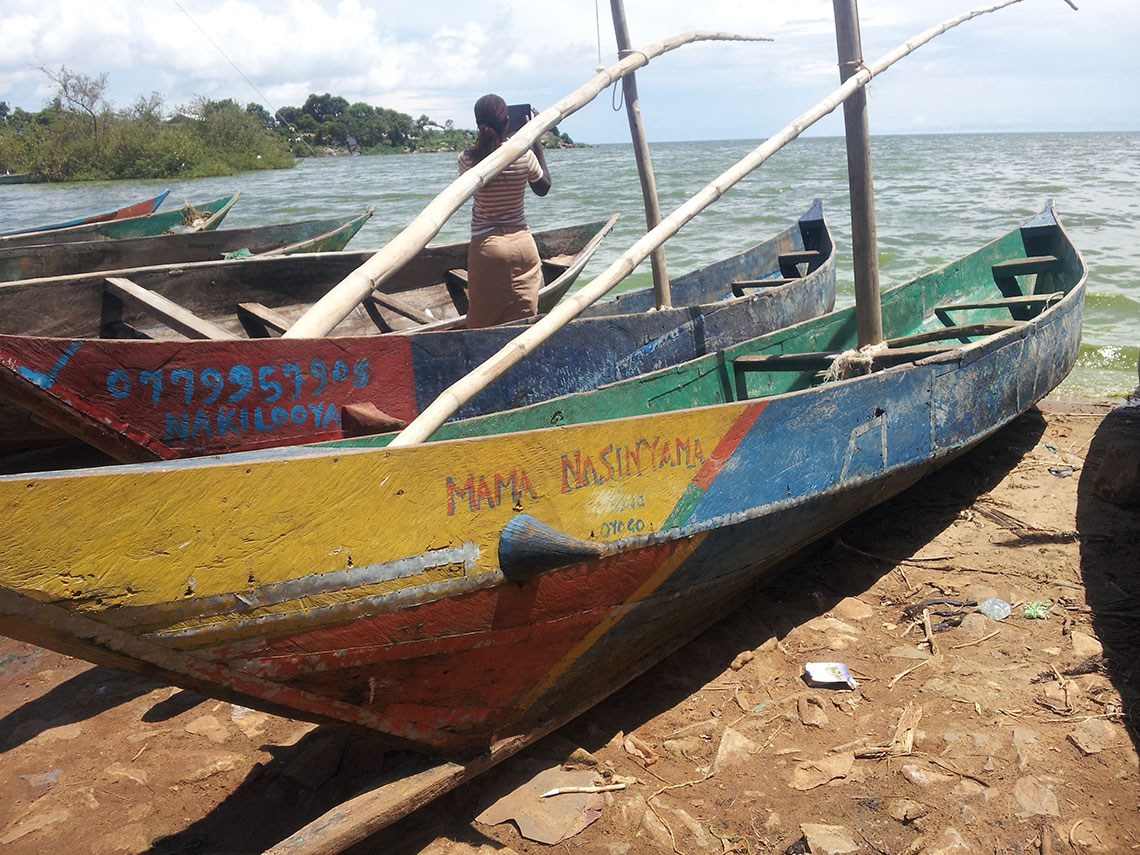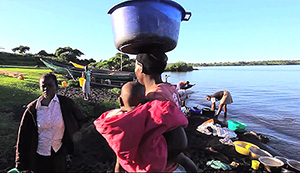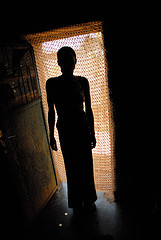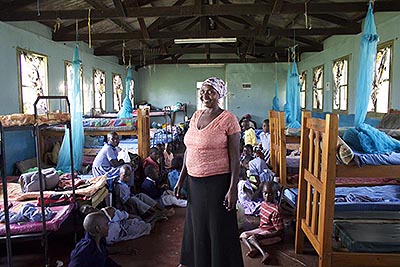PamojaTogether: Telling the Stories of Foreign Aid.

PamojaTogether is a student-powered global news network funded by the Bill and Melinda Gates Foundation that tells the stories of foreign aid from the perspective of the recipient.
Pamoja, the Kiswahili word for together, connects students from countries that receive aid with peers from donor countries in a student-to-student learning process. PamojaTogether is a partnership between Boston University, Jaramogi Oginiga Odinga University of Science and Technology, and Great Lakes University of Kisumu. This global health reporting project sent eight BU students from the BU School of Public Health, BU College of Communication, and BU College of Arts and Sciences to western Kenya where they teamed up with 10 Kenyan students to identify and report on these global health stories.
The goal: to nurture the conversation about aid; tell raw, authentic, and inspiring stories from the field; and engage a worldwide audience in re-imagining aid by telling it like it is.
This is the second of four installments exploring various facets of the way foreign aid is applied on the ground.
Part 2: Leveraging knowledge to fight disease and disability
Illness, injury and disability can devastate a country’s people and resources as ruthlessly as any war.
Aid organizations often appear during a crisis to combat disease outbreaks and — if time and money allow — to teach people in affected communities how to prevent future flare ups. However, fundamental public health principles hold that prevention is far more cost-effective than treatment.
Outreach programs that promote prevention take many forms and fight many foes, but it’s the large-scale government programs that often generate the lion’s share of attention. Massive media campaigns designed to spread health messages as widely as possible are a proven tactic of multinational efforts from various UN-sponsored groups, US aid agencies, and an array of non-governmental organizations.
But how many radio ads promoting condom use can someone listen to before tuning them out? How many signs reminding people to use mosquito nets are too many? As these messages saturate all the readily available audiences, perhaps the greatest gains from program outreach efforts may be found in targeted interventions that identify and serve specific niche populations.
PamojaTogether correspondents documented the efforts of sex workers who are trained to act as peer educators in their city to help encourage condom use and HIV/AIDS testing. Reporters interviewed rural community health workers who use musical skits to spread accessible messages about HIV, malaria, water sanitation, and the importance of staying in school.
Finally, with so much attention paid to major public-health issues such as HIV/AIDS, malnutrition and malaria, the needs of a nation’s disabled community can be easily — and often — overlooked. Foreign aid directed to schools and training programs for the disabled can give them an economic lifeline, and provide a path to self-sufficiency for their students.
Playing for Change
A novel program uses music and skits to convey relevant health messages in rural villages, reports Kasha Patel and Faith Chesire.
The arts have been used throughout history as conduits for customs, traditions, and vital messages – roles that carry critical importance when used to keep people alive.
In western Kenya, troupes of community health workers perform musical skits that use a combination of tragedy, suspense and humor to educate villagers about malaria identification and treatment, avoiding HIV infection, safe water use, and other key health issues.
The skits are short, usually 10 minutes in length, but can pack powerful messages designed to spur economic self-reliance and female empowerment. The skits also help community health workers identify and encourage village residents with serious health issues to seek treatment at larger regional facilities. Grants from USAID and other international agencies support training for the local workers, who fan out into the countryside. Each visits about 100 homes per month.
Health workers believe that using an active visual medium such as theater can convey educational themes far more effectively than relying on lectures and printed information. A 2007 UNESCO survey found that nearly 30 percent of Kenyans over age 15, many of them in rural villages, lacked basic literacy skills. Kasha Patel, a science journalism masters student from COM, and Faith Chesire, an undergraduate student from Great Lakes University, found that oral storytelling is also an important way to communicate health information to elderly illiterate villagers. Read more
Widows of Lake Victoria / Trading Sex for Fish
Reporter Lindsay Hamsik and videographer Jeremy Hartman examine how business training and micro grants can help vulnerable women stay out of the sex-for-food economy.
On the fishing grounds of Lake Victoria, a primary food source for much of western Kenya, the dangerous work of hauling large nets into small boats has claimed untold lives over the years. Many of the men lost in fishing accidents leave families who struggle to survive the additional loss of income and food. In many cases, the widows of these fishermen use the only currency they have – their bodies – to purchase fish to resell or to feed their own families.
The already fragile local economy is subject to additional stress from periodic government-ordered fishing bans designed to renew the depleted fishing stocks. During these bans, which can last months, the lake widows are forced to travel long distances to find work, leaving their children in the care of family or friends, or at home to fend for themselves.
The transactional sex these widows use for family survival has come with a higher unseen cost: the increased incidence of HIV infection in lakeside communities. In the small villages along Lake Victoria, HIV/AIDS prevalence can be as high as 25 percent, significantly higher than Kenya’s national rate of just over 6 percent.
Giving women viable options for work has been the goal of various aid agencies, which have found that small economic investments can make a fundamental difference. Lindsay Hamsik, a graduate student at the BU College of Arts and Sciences, detailed the progress of a program that offers training in business and entrepreneurship for widows and other women on the margins of society. With targeted micro-grants of about $60, these women have started small kiosks selling food and supplies in the lakeside communities, and have taken a giant stride away from trading their bodies for fish. Read more
Signs for Change
Faith-based aid programs help hearing-impaired students learn academic and occupational skills, report correspondent Fiona Atieno Otieno
Nyangoma School for the Deaf has been a lifeline for deaf and hearing-impaired children and teens for more than 50 years, offering academic instruction in sign language and important life skills for enable students to transition into self-supporting adults.
Founded in 1961 by Franciscan nuns from the Netherlands, the school is a cluster of three different facilities designated by age. Upper and lower schools serve ages 5 to 18, while older teens and young adults can explore electrical, computer, building, textile and automotive fields at an affiliated technical institute.
The schools receive funding from a variety of faith-based groups and private foundations from around the globe, much of it going toward infrastructure improvements and sponsorship of student fees.
Fiona Atieno Otieno, a student at Jaramogi Oginga Odinga University of Science and Technology who taught at Nyangoma, offered a unique viewpoint on the services the schools provide and shared her hopes of eventually working with hearing-impaired students. Read more
Selling Sex in Kisumu
An organization helps sex workers navigate a tense coexistence with police and offers health counseling and advocacy, reports Elizabeth Daube.
Sex work remains one of the few viable occupations for many women in parts of Kenya, just as in other countries around the world. The lure of an annual income of up to $8,000 – about 10 times the national average — is enough incentive to persuade women to endure persecution, public shame and stigmatization, and outright violence from both clients and the police.
In Kenya, sex work is not illegal, but is still subject to unofficial police harassment, demands for bribes, and in some cases, kidnapping and rape. Adding to these hazards is the ever-present danger of HIV infection from customers who pay a premium to avoid using condoms.
For a decade, KASH (Keeping Alive Societies’ Hopes) has channeled aid from Kenyan and international sources into innovative programs that address problems of several vulnerable communities. KASH began as a community service organization helping female sex workers but then expanded to offer health education and rights advocacy for people with HIV/AIDS, voter education programs, and became the first agency in Kisumu, a city of about 410,000, to openly hire sex workers and LGBT persons as full-time peer educators.
As SPH student Elizabeth Daube examined in a profile, KASH has engineered mutually beneficial cooperation between police and sex workers that has reduced harassment and conflict and provided police with valuable information on neighborhood crime. Read more
‘Opportunity not Sympathy’
Lawrence Nyanya Otieno chronicled a school in Kisumu that offers physically disabled children a rare chance to lead productive lives in a country where the disabled are often shunned.
Even in 2014, the pervasive stigmatization of physically disabled people in Kenya is a nagging vestige of a time when tolerance and acceptance of disabilities was virtually unknown.
In some communities, ignorance and fear too often accompany the birth of a physically disabled child, who may be seen as a bad omen and something to be shunned. If a child survives the trials of birth and early years, proper schooling is still a formidable obstacle.
PamojaTogether’s Lawrence Nyanya Otieno, a student at JOOUST, had a personal immersion into the lives of many of these special-needs students. For a year, he attended the Joyland School in Kisumu, which caters primarily to physically disabled children. Otieno recounts heartrending stories of parental neglect and societal indifference that compound the already-daunting challenges disabled students face.
Foreign donors help support students via sponsorships and offer direct aid to the school with donations that help maintain buildings and aid purchases of supplies and equipment. But, as Otieno observed, foreign aid can’t help heal the inner pain of someone abandoned by family and left in the care of strangers. Helping some of these students survive as self-sufficient adults is a goal that Joyland still struggles to meet. Read more
Follow Pamoja Together on Facebook and Twitter
Next: How developing educational infrastructure to provide fertile places for personal growth can alter the prosperity of a nation.